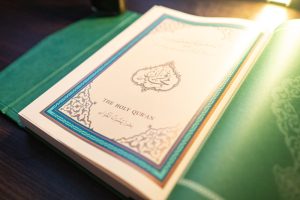هُوَ – huwa [He]: Huwa is an إ سْمُ ضَميرٍ [ism ḍamīr]; that is, huwa is a singular, masculine, third-person pronoun. The Urdu equivalent is ‘وہ’ (voh) [and the English equivalent is ‘he’]. However, in this part of the verse (Qul huwallāhu Aḥad – Say, He is Allah the One) huwa has not been used in this sense, as it can only mean ‘he’ when a noun has been mentioned previously to which it can refer to.
Here huwa is a ضَمير الشأن [ḍamīr al-sha’n] which means ‘the fact is that…; the truth is that…; the great fact is that …; the real, certain and definite thing is that…: Allah is Aḥad [The One].’
ٱللَّهُ – Allah: Allah is the name of that Holy Being Whose existence is eternal and He is Everlasting. He is the Living, Self-Subsisting and All-Sustaining. He is the Master, the Creator and Lord of all creation. Moreover, this is God’s personal name, and not an attributive name. In no other language except Arabic is a personal name found to refer to the Creator and Master of all things. It is only in the Arabic language that ‘Allah’ is used as a personal noun, referring to the One and Only Being. It is used only to refer to God’s name. The word ‘Allah’ is a non-derivative noun ٌإسمٌ جَامِد [ism jāmid], and not a derived noun ٌإسمٌ مُشْتَق [ism mushtaqq]; that is, the word ‘Allah’ has not been derived from any other word, nor has any word been derived from it.
أَحَدٌ – Aḥad: In the Arabic language, two words may be used to express the concept of oneness; one word is ٌوَاحِد [Wāḥid] and the other is ٌألحَد [Aḥad]. The Arabic lexicon says this about the word Wāḥid:
الوَاحِدُ أوّلُ العَدَدِ يُقَالُ: وَاحِدٌ اِثْنَانِ ثلاثةٌ
This means that in the Arabic language, Wāḥid refers to a number from which other numbers succeed or continue on from, such as two, three, four and so on. [1] However, in Arabic, the word Aḥad is used when it is inconceivable for other numbers to follow from or even exist in juxtaposition with it. For instance, in Urdu, its meaning is conveyed by the word akaila and in English, it is called oneness. Thus, when we refer to ‘one’, the sense of there being two, three, four and five comes to mind. But when we say oneness, there are no words such as two-ness or three-ness.
In ‘Aqrab al-Mawarid, it is stated:
الفَرْقُ بَيْنَ الأَحَدِ وَالوَاحِدِ أنَّ الأَحَدَ اِسْمٌ لِمَنْ لَّا يُشَارِكُهُ شَيْءٌ فِيْ ذَاتِهِ، وَالوَاحِد اِسْمٌ لِمَنْ لَّا يُشَارِكُهُ شَيْءٌ فِيْ صِفَاتِهِ
That is, Aḥad and Wāḥid are used with reference to the Being of Allah Almighty and the difference in their meaning is that when the word Aḥad is used for Allah Almighty, it expresses the oneness of His Being and that when one properly perceives Him, the thought of any other being is inconceivable. [2]
And when the word Wāḥid is used for Allah Almighty, it signifies the uniqueness of His attributes; that God is Wāḥid in His attributes. This means He is perfect in all His attributes and aside from Him there is no other being who is complete with respect to their attributes.
Thus, the meaning of قُلۡ هُوَ ٱللَّهُ أَحَدٌ (Qul huwallāhu Aḥad) is: ‘Proclaim that the real, certain unequivocal truth is that Allah is entirely Unique in His Being and Oneness.’
ENDNOTES
[1]‘Aqrab al-Mawarid.




Add Comment